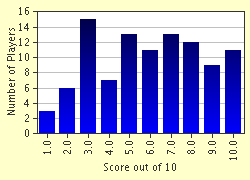Quiz Answer Key and Fun Facts
1. War was declared between Japan and China in 1894 due to their conflicting political and trade interests in Korea. What was Japan's primary interest at the time?
2. Which event sparked a rebellion in Korea, giving China cause to pour some 8000 troops into Korea, infuriating Japan, and breaking the 1884 Li-Ito convention?
3. War was declared August 1894. The more modern Japanese forces smashed China on both sea and land and occupied Manchuria. Which area of China is this province located?
4. 1905: The Japanese defended Korea and areas they held in China from incursions by which well established great power?
5. In 1931 the Chinese left the door open for another Japanese invasion on Manchuria. Why was the province so poorly defended?
6. In order to expand Manchuria and gain access to more resources, Japan needed to find a way to break treaties that were preventing hostilities. In 1937 the Japanese fabricated an attack on a railway leading to Chinese reprisal at which Chinese landmark?
7. Small skirmishes soon erupted to full scale invasion with 3 more Japanese divisions committed to China. Was Emperor Hirohito in favour of war in China?
8. This city was full of refugees from the fall of Shanghai. The National army had withdrawn, and without defences it was to be the scene of one of the darkest atrocities in the history of war.
9. Japan was pushed out of southeast China and fell back to lines in Manchuria once the ROC armies and the CCP (Chinese Communist Party) armies finally united forces against Japan.
10. After the Japanese surrender, civil war erupted between the republic and the communists. This war was to last another 4 years but wouldn't have been possible in full scale without the mass arming of the CCP. How did the CCP obtain a mass armament?
Source: Author
Bertho
This quiz was reviewed by FunTrivia editor
coolupway before going online.
Any errors found in FunTrivia content are routinely corrected through our feedback system.


